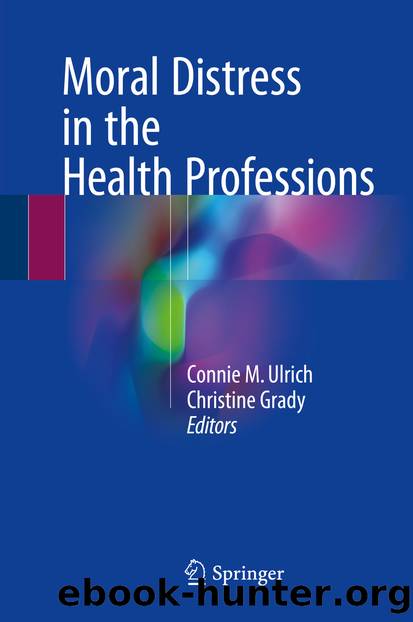Moral Distress in the Health Professions by Connie M. Ulrich & Christine Grady

Author:Connie M. Ulrich & Christine Grady
Language: eng
Format: epub
Publisher: Springer International Publishing, Cham
5.2.1.3 Interprofessional Practice
Moral concerns are grounded in an individual’s personal and professional values. Beliefs about how best to proceed in ethically complex treatment situations will in part be influenced by past experiences and professional training. How any one individual sees a situation and determines how best to enact their professional obligations will vary. Medicine’s well-established hierarchy and requirements for years of clinical training brings professionals with varied knowledge and skill sets as well as diverse beliefs and values to the bedside. Findings in a study focused on ICU intrateam dynamics suggest that discordance within a team is a prominent source of moral distress across health professions [49]. In academic settings, highly experienced nurses may be dependent on medical trainees with less knowledge and experience to obtain “orders” for needed care. Care that is deemed “futile” by one clinician may be seen as restorative or curative by another. Other circumstances that influence intra-professional relationships but may be invisible in the daily intensive work of an acute care setting include each person’s guiding philosophies or beliefs, spiritual or religious beliefs, and cultural norms. These personal characteristics influence patterns of decision-making and assessments of acceptable benefits and burdens for patient suffering. The concept of a moral community emerged in one study where critical care nurses with strong communication and conflict resolution skills saw themselves as essential to the decision-making process regarding the withdrawing of life-sustaining treatment and described practicing in “supporting” relationship with physician colleagues; moral distress was not described [50]. Redefining and exploring this concept of a moral community where the work of professionals is characterized not as teamwork but rather moral work where the shared goal is the well-being of patients may offer an antidote to moral distress. Sources of moral distress arising from conflicting professional duties, lack of continuity of care and truth-telling, and disregard for patient wishes may be less likely to develop.
Download
This site does not store any files on its server. We only index and link to content provided by other sites. Please contact the content providers to delete copyright contents if any and email us, we'll remove relevant links or contents immediately.
When Breath Becomes Air by Paul Kalanithi(7256)
Why We Sleep: Unlocking the Power of Sleep and Dreams by Matthew Walker(5637)
Paper Towns by Green John(4165)
The Immortal Life of Henrietta Lacks by Rebecca Skloot(3821)
The Sports Rules Book by Human Kinetics(3582)
Dynamic Alignment Through Imagery by Eric Franklin(3483)
ACSM's Complete Guide to Fitness & Health by ACSM(3462)
Kaplan MCAT Organic Chemistry Review: Created for MCAT 2015 (Kaplan Test Prep) by Kaplan(3419)
Introduction to Kinesiology by Shirl J. Hoffman(3297)
Livewired by David Eagleman(3117)
The River of Consciousness by Oliver Sacks(2989)
Alchemy and Alchemists by C. J. S. Thompson(2909)
The Death of the Heart by Elizabeth Bowen(2897)
Descartes' Error by Antonio Damasio(2728)
Bad Pharma by Ben Goldacre(2724)
The Gene: An Intimate History by Siddhartha Mukherjee(2489)
Kaplan MCAT Behavioral Sciences Review: Created for MCAT 2015 (Kaplan Test Prep) by Kaplan(2487)
The Fate of Rome: Climate, Disease, and the End of an Empire (The Princeton History of the Ancient World) by Kyle Harper(2431)
The Emperor of All Maladies: A Biography of Cancer by Siddhartha Mukherjee(2427)
